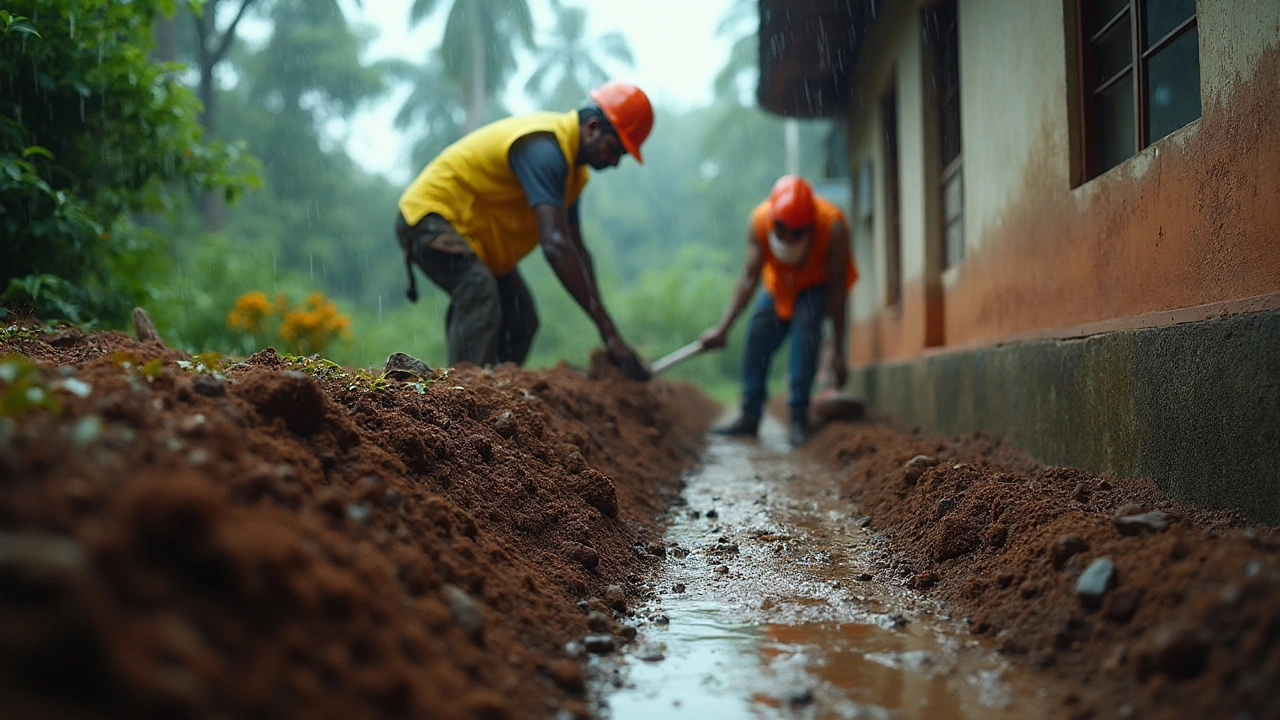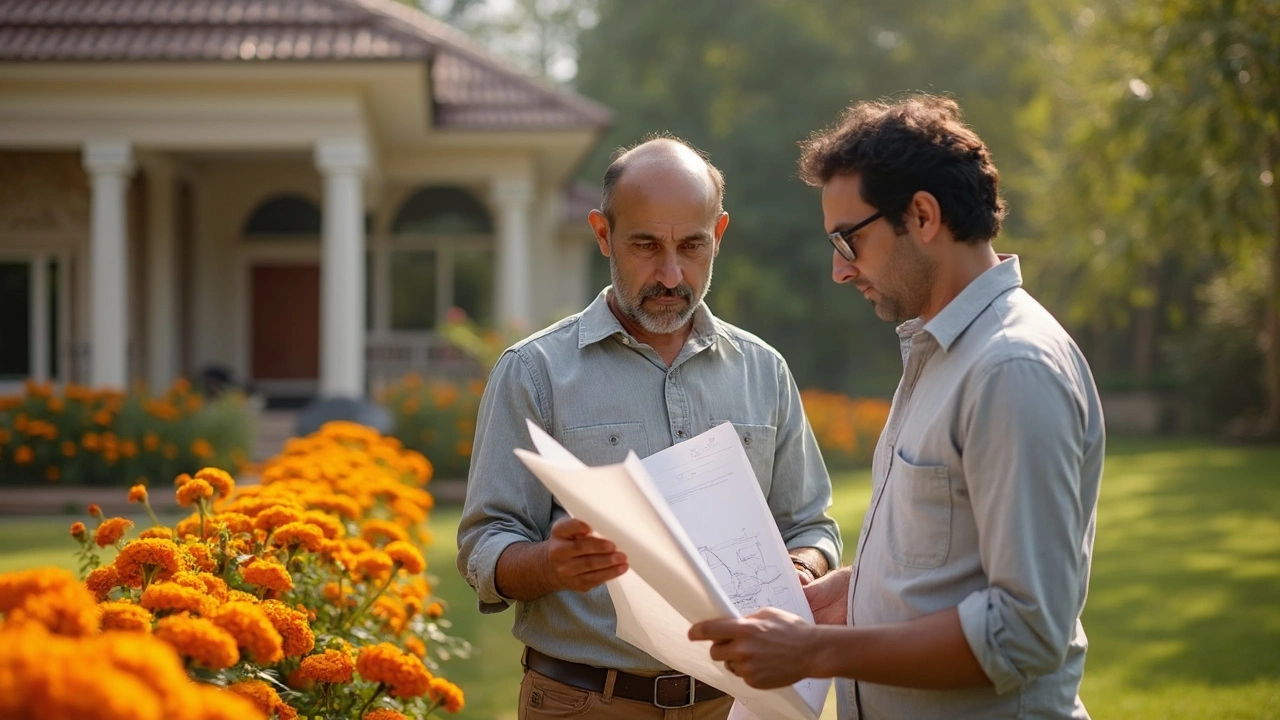Major Foundation Repair: What It Really Means

Major foundation repair—just hearing it can be enough to make any homeowner's heart skip a beat. It sounds intense, but what does it really involve? Understanding the scope of these repairs is essential because they go beyond minor fixes. We’re talking about actions required when the integrity of your home is at stake.
Now, what sets these repairs apart? Typically, they tackle critical structural issues like substantial cracks, settlement problems, or even water damage compromising your home's foundation. You might be surprised to know that about a quarter of U.S. homes experience some form of foundation distress but don't panic just yet.
Recognizing the signs early can save you headaches later. Look for things like doors that refuse to close properly, cracks in the walls wider than 1/8 inch, or floors that aren't level. Catching these early can prevent what could become a much bigger, and costlier, ordeal.
- Understanding the Scope
- Key Indicators of Major Repairs
- Techniques and Strategies
- Choosing the Right Professional
Understanding the Scope
When we talk about major foundation repair, we're referring to solutions that address critical issues which, if left unchecked, could seriously impact your home's structural integrity. These aren't just quick fixes; they're comprehensive efforts that often involve heavy machinery, expert assessments, and a thorough approach to solving fundamental problems.
What's Involved in Major Repairs?
The scope can vary but commonly includes underpinning, stabilization, and possibly rebuilding sections of the foundation. Underpinning might involve strengthening the existing foundation by adding support beneath it. Sometimes, it could mean replacing several units or slabs if they're beyond repair. In severe cases, you might find entire sections need to be excavated and reconstructed.
This work often requires both structural engineers and foundation specialists. You can't just patch up the cracks and call it a day; these jobs usually mean getting under the house and ensuring that every part is stable and solid.
Why is This Important?
Why go through all this trouble? Well, a strong foundation is literally what keeps your house standing and safe! Ignoring home foundation issues can lead to more severe problems down the track, including potential collapse in extreme situations. Plus, addressing major issues can increase your home’s market value.
| Type of Repair | Average Cost |
|---|---|
| Crack Repair | $500 - $2,000 |
| Underpinning | $5,000 - $15,000 |
| Full Foundation Replacement | $20,000 - $100,000 |
With costs ranging significantly depending on the severity and the methods used, understanding the scope helps in planning and prioritizing the necessary repairs.
Key Indicators of Major Repairs
You might be wondering when those cracks in your walls go from being a new paint job to a sign of something much more serious, like needing major foundation repair. Here’s what to keep an eye on.
1. Cracks Are More than Skin Deep
Sure, cracks can be natural as homes settle, but anything wider than 1/4 inch deserves attention. Look for horizontal cracks in particular, which point to significant structural issues rather than simple settling. And if you spot cracks in the foundation itself, it might be time to call in the experts for some foundation repair.
2. Doors and Windows Acting Up
Have a door that's suddenly a challenge to close or a window that won't budge? They might be telling you that the house is moving in ways it shouldn't. These are common signals that your home’s foundation, quite literally, isn’t on the level.
3. Sloping or Uneven Floors
Floors looking a bit like a funhouse mirror? Seriously uneven or sloping floors can be pretty solid indicators of a foundation problem. Slight slopes can often become more pronounced over time if left unchecked.
4. Water Pooling and Drainage Issues
Check for water pooling near your foundation after a rain. Poor drainage can lead to soil expansion and affect foundation stability. A walk around your home after a heavy rain can tell you a lot about what’s happening underground.
5. Unpleasant Odors
Let's face it, musty odors can be off-putting, but they can also signal something bigger. Persistent smells might be due to water intrusion or increased moisture – both factors that can negatively impact a home foundation.
If two or more of these issues are present, it might be smart to consult with a professional. They can assess whether it’s a minor annoyance or a candidate for structural repair. Remember, early intervention can make a big difference, not just in peace of mind, but also in your wallet.

Techniques and Strategies
Tackling major foundation repair requires not just any quick fix but a targeted approach. There are several effective techniques to stabilize and secure your home's foundation that are worth knowing.
1. Piering and Underpinning
When your house is settling unevenly, piering can be a lifesaver. This technique involves driving steel piers deep into the ground to lift and stabilize the foundation. It’s like giving your house crutches until it can stand tall on its own again.
2. Slab Jacking
If your foundation slab is sinking, slab jacking might be the answer. It involves pumping a cement mixture beneath the slab to level it out. This option is generally less intrusive and can be done relatively quickly compared to others.
3. Crack Repair
Those pesky cracks in your walls or flooring might not just be cosmetic issues; they could signal foundation troubles. Epoxy injections or carbon fiber repairs can help here. They seal the cracks, prevent further damage, and stabilize the structure.
4. Drainage Improvement
Water is the bane of any foundation. Improving drainage around your home can prevent water from undermining your foundation. Installing French drains or exterior waterproofing are solid strategies to keep things dry.
Here's a quick table to compare these foundation repair techniques:
| Technique | Best For | Time Required |
|---|---|---|
| Piering and Underpinning | Uneven Settling | Weeks |
| Slab Jacking | Sinking Slabs | Days |
| Crack Repair | Visible Cracks | Days |
| Drainage Improvement | Water Issues | Varies |
Choosing the right technique largely depends on the specific issues with your foundation. It's often best to have a professional assessment to determine what your home needs. After all, securing your foundation is about ensuring the stability of your entire home.
Choosing the Right Professional
When it comes to tackling major foundation repair, picking the right person for the job is crucial. Sure, it’s a tough decision, but getting it right the first time can save you tons of stress and cash down the line.
First things first: do some homework. Check out reviews online, ask friends or neighbors if they've had foundation repair work done, and see whom they'd recommend. An expert in structural repair will have a solid track record that you can verify through past projects.
Check Qualifications and Experience
Credentials matter. Make sure the contractor you pick is licensed, insured, and has relevant certifications. This ain't the time to be shy—ask how long they've been in the biz and whether they've done repairs similar to the work needed on your home.
Understand Their Repair Approach
Every professional might have a different approach, so it’s crucial to understand their plan for your particular issue. Will they reinforce your home's foundation with piers, or are they suggesting a completely different technique? Don’t hesitate to ask why they're recommending certain methods and how those will address your unique situation.
Getting Multiple Estimates
Price tags can vary, so it's smart to get estimates from at least three different contractors. This not only gives you a range of costs but also lets you evaluate each pro’s approach and service. Be wary of quotes that are significantly lower than others; sometimes, you get what you pay for.
Red Flags to Avoid
Watch out for contractors who ask for full payment upfront. A reputable professional will set a payment schedule that's based on the progress of the work. Also, if someone pressures you to make an immediate decision, consider it a red flag. You need time to weigh your options without stress.
To recap, making sure you're armed with all the right information will help you choose the professional who can best handle your foundation repair needs.


